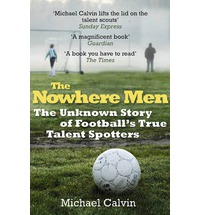Book Review: Whose Game Is It Anyway? Football, Life, Love & Loss by Michael Calvin
 The COVID pandemic forced us to change the way we live and being confined to our homes gave some people the opportunity to take up new hobbies and interests, whilst for others it provided a time for contemplation and reflection. Michael Calvin, the award-winning journalist and sportswriter turned his hand to what his does best – writing – during lockdown, and produced Whose Game Is It Anyway? Football, Life, Love & Loss.
The COVID pandemic forced us to change the way we live and being confined to our homes gave some people the opportunity to take up new hobbies and interests, whilst for others it provided a time for contemplation and reflection. Michael Calvin, the award-winning journalist and sportswriter turned his hand to what his does best – writing – during lockdown, and produced Whose Game Is It Anyway? Football, Life, Love & Loss.
Whilst the title suggests a book dominated by football and the desire to answer the question it poses, it gives the reader so much more than that. This is a wonderful read that draws on all Calvin’s experiences from his working and personal life to explore the role of sport in our lives and in a wider context in areas such as global politics.
Style wise, this is a book which is part biography, part diary, part critique and part homage, but overall is very personal. As a reader there is an intimacy in the writing that felt like Calvin was taking directly to me, whether this was about him having tuberculosis as a child or his encounters with sporting legends such as Muhammad Ali or Bobby Charlton.
Having been written during the pandemic this is a book of the time, with Calvin open in his criticism of Boris Johnson and his Government in the handling of the situation. Indeed, politics features in a number of chapters, as various sport events that Calvin attended over the years are explored to explain the ways in which regimes tried (and continue to try) to use them for political gain.
Indeed you get the feeling that Calvin is no fan of politicians, with a picture in the book of Margaret Thatcher in the aftermath at Hillsborough, labelled, Eyes of an owl, instincts of a shark…Her credo, that football fans deserved to be treated as second class citizens, endures. However, it isn’t just politicians who come in for criticism with Calvin critical of the way the media hounded and dealt with ex-England managers Bobby Robson and Graham Taylor. But in case you think this is a one-way street in terms of handing out reproach, Calvin uses the book for self-reflection and acknowledges mistakes he has made down the years.
Whilst Calvin is known as a journalist and sportswriter, the book lets you into his world as a competitor within rallying and sailing and these chapters provide another window into his character and the challenges they threw up. Combine this with his years travelling around the world as a journalist and you can feel the frustration that lockdown imposed on Calvin where the book takes on a diary like feel.
Does this book answer the question posed within its title? Without giving anything away, for this reader it does. And now having completed reading the book, the reaction is to start it over again as there are undoubtedly so many nuances in the writing that will be found in a second read.
This surely has to be on the William Hill Sports Book of the Year list when voting comes around next time.
(Pitch Publishing. April 2021. Hardback 320 pages)
Michael Calvin’s football books include: No Hunger In Paradise: The Players. The Journey. The Dream, Living on the Volcano: The Secrets of Surviving as a Football Manager, The Nowhere Men: The Unknown Story of Football’s True Talent Spotters, Family: Life, Death and Football: A Year on the Frontline with a Proper Club, State of Play: Under the Skin of the Modern Game and Life’s a Pitch.
 With the number of football books that are released each year, they have to focus on a unique topic or be very well written to stand out from the crowd. Michael Calvin’s The Nowhere Men ticks both these boxes.
With the number of football books that are released each year, they have to focus on a unique topic or be very well written to stand out from the crowd. Michael Calvin’s The Nowhere Men ticks both these boxes.